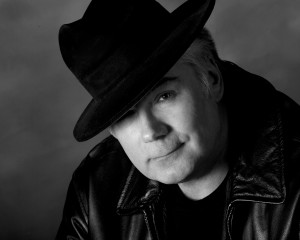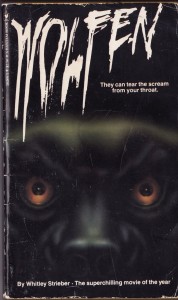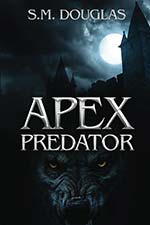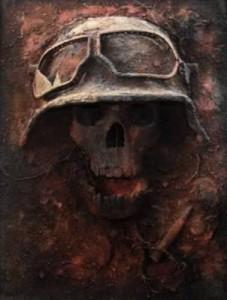I have a treat for horror fans and aspiring authors alike. I ran into Stone Wallace on social media and asked him about doing an interview. Needless to say, he agreed and here we are!

For those of you who don’t know – Stone Wallace (pen name Mason Burgess in the horror field) has worked as a professional writer/editor for over 30 years. He has published 18 books (novels and non-fiction), written numerous articles for North American publications and websites, and has conducted many celebrity interviews. He attended Red River College, The National Institute of Broadcasting and Robertson Broadcast Academy. He lives in Winnipeg, Canada with his wife Cindy, who is also an author and children’s entertainer.
In terms of his horror writing Burgess/Wallace is best known for Child of Demons (published in 1984) which sold a staggering 50,000 copies in North America (wouldn’t we all be so lucky and good). He has authored a number of other horror works so please get ready for an exclusive conversation with the helpful and informative Mr. Stone Wallace:
(Please note that Random Pop Culture was the old name of my blog before it was folded into my author page. I like to still use the name out of a sense of nostalgia. So bear with me dear readers and know that RPC means S.M. Douglas!)
Random Pop Culture: Hello. Please tell us something about yourself, where you’re based, and how you came to be a writer.
Stone Wallace: My name is Stone Wallace and I was born and live in Winnipeg, Canada, where the winters can be snowy and frigid and the summers hot and humid. I’ve been a storyteller all my life with an emphasis on the macabre since my first literary influence (and at a comparatively young age) was Edgar Allen Poe. Later I began reading other authors who specialized in the supernatural and soon began trying to emulate them by writing similar stories, admittedly crudely but it was a start. I was very fortunate in that neither of my parents ever discouraged my interest in horror. In fact, both supported me. My interest in possibly pursuing writing as a career was stimulated by Stephen King’s novel Carrie. That book hit a nerve in me, and with that as my creative thunderbolt I set about writing a book. I actually completed it; it didn’t sell. But I’d proven to myself that I could write a novel.
Random Pop Culture: Why horror?
Stone Wallace: Well, I grew up a Monster kid. Lived for our Saturday night Chiller movie and barely a Saturday afternoon went by when you wouldn’t find me downtown sitting through reissues of Hammer or AIP horror movies – or even triple features showcasing 50s horror or sci-fi flicks. You know, those memorable gems like FROM HELL IT CAME and THE GIANT CLAW. Those Saturdays helped get me through a long school week. Plus, of course, I collected every monster magazine I could find: Famous Monsters of Filmland, Castle of Frankenstein, Monster Mania, along with genre comic books, like Creepy and Eerie. I embraced the genre. Still do, though with a preference for those older classics. I’m really not a fan of excessive graphic violence or torture porn. Plus I enjoy a little humor blended in with the horror, as in THE HOWLING and AN AMERICAN WEREWOLF IN LONDON.
Random Pop Culture: What are your favorite works to-date? Have you ever written under a pseudonym?
Stone Wallace: Yes, my first novels were written under the pseudonym of Mason Burgess. That was the publisher’s suggestion, which was wise since my last name starts with a “Z” (bad location in a bookstore, bottom shelf) plus is very ethnic and difficult to pronounce. Mason Burgess put me at eye level on brick and mortar shelves).
Random Pop Culture: Have you had any rejections? If so, how do you deal with them?
Stone Wallace: Of course. My first attempt at a horror novel was rejected (as well it should have been given that it was a crude first effort). But the good news was that in one of the rejection letters I received the editor commented that while that particular book didn’t make the grade, he saw that my work showed promise and that I should try something else and re-submit, which I did. Well, that second book also got rejected but I didn’t give up because I remained encouraged thanks to that editor and the book was eventually published by Leisure Books as a mass market paperback. I’ll always remain grateful to that editor for his supportive words to a novice writer.
Random Pop Culture: Do you have an agent? Do you think they’re vital to an author’s success?
Stone Wallace: Had an agent for two of my Western novels. Unfortunately, when the publisher who purchased those books decided to stop publishing Westerns my agent and I parted ways. Definitely an agent can be helpful to an author’s success. Granted, back in the day someone like Stephen King made the breakthrough on his own (with the help of a very supportive editor), but times are much different today. Even some smaller houses insist on agented submissions. An agent can also be valuable in negotiating subsidiary and ancillary rights – and those are certainly nice to have.
Random Pop Culture: Do you read eBooks or is it paper all the way?
Stone Wallace: Definitely paper. I much prefer holding a print copy in my hands, be it a book or magazine.
Random Pop Culture: How much of the marketing do you do for your published works or indeed for yourself as a ‘brand’?
Stone Wallace: Marketing is essential. If you just sit back and do nothing to promote your book on your own initiative . . . well, one day you’ll open a copy of your book and watch moths fly out. What’s interesting is that I’ve discovered that many writers find it difficult to go out and promote their books. They’re uncomfortable to be interviewed or appear in the media because their comfort zone is solely in their writing. Man, you’ve got to get your ass out there unless you’re content to write in a vacuum.
Random Pop Culture: Do you have a favourite of your books or characters?
Stone Wallace: My horror novels were early efforts and I’d love another crack at them (as I think would most writers). I suppose my favorite of the three would be Blood Moon. It became a best seller so naturally that plays a part. Also, the lead character was sort of based on myself. I’d have to say, though, that the favorite of all my books would probably be my Western Montana Dawn. I’m very proud that the book was listed as “One of the Ten Best Westerns of the Decade” by Booklist. Especially flattering and gratifying since it was only my second Western, a genre I’d never really explored before.
Random Pop Culture: Did you have any say in the titles / covers of your book(s)? How important do you think they are?
Stone Wallace: The titles of my first two horror novels, published back in the mid-80s were changed. My first book was changed from Child of Adamm to Child of Demons. I can understand why the publisher wanted to go with a more explicit title, but I actually wasn’t happy with it since the book had nothing to do with demons. As for a book’s cover, I feel it is important the design is a collaborative effort between the artist and the author. They definitely should be in sync as the cover should give some idea of what the book is about, even if only a teaser.
Random Pop Culture: What are you working on at the moment / next? Any future horror books in the works?
Stone Wallace: Yes. Finishing up a Western that may be my final work in the genre. Sadly, Westerns have been an ebb and flow genre, and as much as I enjoy writing them, the sales have been disappointing. Horror, on the other hand, always seems to be popular (though some publishers have become myopic about their potential in the marketplace, or perhaps have just become too highbrow – or maybe the quality just ain’t there; I think that’s why the big boom of horror literature started to dry up in the late 80s). Hoping to keep original, I’m working on a new horror story that explores another fascination I have with the supernatural. Of course, I can’t reveal much more at this point.
Random Pop Culture: Who are your favorite horror authors? What are your favorite horror movies?
Stone Wallace: My new horror novel is dedicated to the masters: Robert Bloch, Ray Bradbury, Stephen King and Richard Matheson. But I could also include earlier influences such as, of course, Poe, Bram Stoker and M.R. James, among others. The British authors Ramsey Campbell and the late James Herbert are also genre writers I highly admire.
Random Pop Culture: What do you see as the essential elements of a good horror book?
Stone Wallace: Believable characters. I feel for a horror novel to work most effectively you have to believe the people in the story. If you can accept them as real with recognizable human traits, you can more readily believe the situation no matter how far beyond the realm of reality it becomes. Plus, you care more for people you can identify with. You are genuinely concerned for their welfare and if they will survive whatever horrifying or unpleasant scenario they may be facing.
Random Pop Culture: Do you manage to write every day? Do you ever suffer from writer’s block?
Stone Wallace: I think one of the most difficult hurdles for a writer to overcome is discipline. Trying to balance your creative time with other duties, be they a job, taking care of housework or the needs of children. And if you are fortunate enough to be a full-time writer . . . it can become easy at times to get a little lazy. You might look for any reason to take a day away from the computer. Or at least to procrastinate. This can be especially true when just starting out to write a new book. Staring at a blank piece of paper or an empty computer screen and realizing with sudden horror that you’re going to have to create a story composed of about 300 pages. It’s a daunting proposition. The secret is just write. Something. Anything. Stephen King, for instance, began his mammoth epic The Stand with just a straight simple sentence, and the book grew from there. I doubt he knew where he was going from that starting point. As for writer’s block . . . I doubt there’s a writer who hasn’t at times suffered from some form of it. Again, the solution is just to write something. Keep the momentum going. Often it helps to provide a running start to where you’re next going with your story. Another trick is to end your day’s writing on a cliffhanger, as it were. A point of suspense and excitement where you’re eager to get back to work to see how things are going to develop. A nice clean tidy wrap-up to your day’s writing is not necessarily the best answer. Because no matter how far along in the narrative you are, if your next day’s writing doesn’t excite or stimulate you, it’s almost like you’re starting over, staring into that blank piece of paper or empty computer screen. And the procrastination may begin anew.
Random Pop Culture: Do you plot your stories or do you just get an idea and run with it?
Stone Wallace: There’s always a basic plot or at least a kernel of an idea germinating in my brain. But once I have that established I let my characters and the existing circumstances guide me onward. Doesn’t always work; you can occasionally run into a brick wall because the plotting suddenly goes astray. Personally, though, I think it’s more fun to let your characters take you along on their journey rather than the other way around. I’ve had characters who initially I planned to survive suddenly killed off halfway into the story. Even surprised me since that wasn’t my intention, but the circumstances dictated that they had to suffer that fate. That’s really the fun and excitement of writing. And I want to have fun when I write, otherwise I might as well go work at a gas bar.
Random Pop Culture: Do you have a method for creating your characters, their names and what do you think makes them believable?
Stone Wallace: As to having a method – not really. I usually have some basic idea as to their personalities, relationships, whatever. But I find that once these are established the characters flesh out on their own as the story progresses. Sometimes I base certain characteristics on people I know – even myself. I try to ensure that all of my characters, be they virtuous or evil, have identifiable human qualities. As I said earlier, this can really assist in the suspension of disbelief.
Random Pop Culture: Do you write any non-fiction or short stories?
Stone Wallace: Yes, I’ve written a number of non-fiction books: both histories and biographies. I’ve also written non-fiction pieces and critiques for websites and conducted celebrity interviews for various entertainment publications. I used to write short stories, but I find greater satisfaction working on novels. I prefer the larger landscape of writing a book.
Random Pop Culture: Do you do a lot of editing or do you find that as time goes on your writing is more fully-formed?
Stone Wallace: Yes, I do a fair amount of editing (both during the writing and post-completion of the book) – and for that I thank God for the computer. Can’t believe I wrote my first three books on a portable manual typewriter, tearing out whole pages and rewriting them because maybe a sentence was off or I’d discovered a story contradiction. I could never imagine myself doing that again.
Random Pop Culture: Do you have to do much research?
Stone Wallace: Depends of the book. With my Westerns and especially my biographies I do quite a lot of research. The fun thing about writing horror is that you can let your imagination go wild. Certainly there are times when you must do some research to maintain a level of believability if the situation warrants it (again, hooray for the computer and the internet, saving sometimes hours on searching for information at the library), but overall I think the writer has more leeway when writing a story of the bizarre.
Random Pop Culture: What point of view do you find most to your liking: first person or third person? Have you ever tried second person?
Stone Wallace: Most of my books have been written in the third person, though my Western Witness Seeker and its sequel Johnny Scarface were both written in the first-person narrative, and I do have to say I had a lot of fun writing in that fashion – really puts you as the author more directly into the story. Have yet to try second person. But that could be interesting.
Random Pop Culture: Do you have pieces of work that you think will never see light of day?
Stone Wallace: I think most authors have those books that we’ve put away in the trunk for whatever reason: not publication-ready, too many rejections. Likely they will continue to wallow in the darkness.
Random Pop Culture: What’s your favourite / least favourite aspect of your writing life? Has anything surprised you?
Stone Wallace: Well, my favorite obviously is the whole creative process. The least are those days when you either just can’t motivate yourself to write, or when you do you think what you’ve written is the worst tripe ever composed and you question your abilities as a writer. Fortunately, those are just spells that come and go.
Random Pop Culture: What advice would you give aspiring writers?
Stone Wallace: If writing is really what you want to do – if you truly have the fire in the belly, persevere and develop a very thick skin. It’s a business heavy with rejection. The stats against getting you book published are staggering. And even if you break through, odds are you’ll have a difficult time earning a living at it. The competition is too great – just take a walk through any bookstore – and that’s only a fraction of the number of books that are out there. So write because it’s your passion; not because you expect to be living the Stephen King dream. Lightning does indeed strike: J.K. Rowling. Stephanie Meyer, Nicholas Sparks are examples . . . but never lose sight that those are the exceptions. Another thing I should mention is that it helps to have patience. Even with many publishers (and agents) accepting manuscripts electronically, it can still take a while for an author to receive feedback with them receiving literally thousands of manuscripts and book proposals annually. Still, it beats having to send the material by post, which is a much longer process – and can be costly, too.
Random Pop Culture: Where did your ideas for your horror books come from? What prompted you to write horror book?
Stone Wallace: I decided to write horror because when I graduated college I realized I did not want to use my degree to report on government or local politics which I spent a great deal of time doing during my journalism studies. Always wanted to write a book, had a passion for horror, and with Stephen King being the big name in horror at the time, opening the door for so many other genre writers, I realized the timing was perfect for me to take the plunge.
Random Pop Culture: Are there any writing-related websites and/or books that you find useful? (please include links where you can)
Stone Wallace: One of the best books I’ve read on the subject is Chicken Soup for the Writer’s Soul. I recommend that book to anyone who either is a writer or wants to write. First-hand accounts and some really surprising facts about the highs and lows of being an author, including rejections of books that became blockbuster bestsellers.
Random Pop Culture: What do you think the future holds for a writer?
Stone Wallace: Boy, that’s a tough one. The publishing industry changes so drastically so frequently. Tastes change (as I discovered with my Westerns) as do submission requirements. It was much easier to break into the field when I started. It’s tougher now since there seems to be much more competition. An author really has to take an active hand in promoting his or her book to even get someone to know it’s out there among the many thousands of others. Of course, ideally the publisher should do his part, too. It should be a cooperative effort since both parties ultimately benefit.
Random Pop Culture: Where can we find out about you and your work?
Stone Wallace: I have a Facebook page. Also, information is available on the Fear Front website. And my books are available on Amazon and discussed on Goodreads.
Random Pop Culture: Is there anything else you’d like to mention?
Stone Wallace: Well, I know that some of what I wrote might seem discouraging to the potential author. But I’ve been at this racket for a long while and still don’t make a living at it. I suppose what that means is either I’m a masochist or I’m obsessed with the craft. And if one is really sincere about writing, put aside the dreams of fame and fortune and just tell the best damn story you can. And don’t worry too much about the mechanics of writing – that can be learned. Focus on creating a compelling plot and bringing to life characters who are real and ones who the reader will care about that. And I wish you only the best of luck!
Now, here is an excerpt of Mr. Wallace’s writing:
A small corner of the northwestern quarter of the cemetery had its own grim significance. It was there that two open graves could be found next to one another, side by side, but situated several yards from the other burial plots, the result of a vague yet superstitious fear that the other children who shared the soil could be corrupted, as if a contagion permeated the very ground where the bodies were soon to rest.
These two graves were to hold the victims of a brutal tragedy.
It was autumn, the season of Halloween. And the celebration was just a week away. But there would be no trick-or-treating that year. No happy costumed children running door to door with their sacks and pails seeking candy. No little witches and princesses parading the streets. No goblins or ghouls haunting doorsteps…
For that was the year a very real “ghoul” appeared in Clear Vista. A boogeyman, whose stay in town was brief, but who left behind death and despair. A stranger who carried with him an unspeakable evil.
The devil had come to Clear Vista and life in the seaside community would never be the same.
Finally, we have a synopsis of Mr. Wallace’s latest book:
Mysterious death plague the peaceful coastal town of Clear Vista. These include prominent citizens whose own children have died under curious and suspicious circumstances. These recent deaths are not viewed at as murders, some appear accidental or the result of natural causes. Yet to Police Chief Braden Powell, a man who suffered his own tragic personal loss, suspicions grow. As the one person in Clear Vista with a deeper knowledge as to what may be concealed truths, he questions the “official” findings. And as he digs deeper into discovering the truth, little does he realize the horror he is about to uncover. A horror that ultimately will affect him personally as it threatens to overwhelm the community.
With that said I’d like to once again thank author Stone Wallace for offering this exclusive and much appreciated interview!




Recent Comments